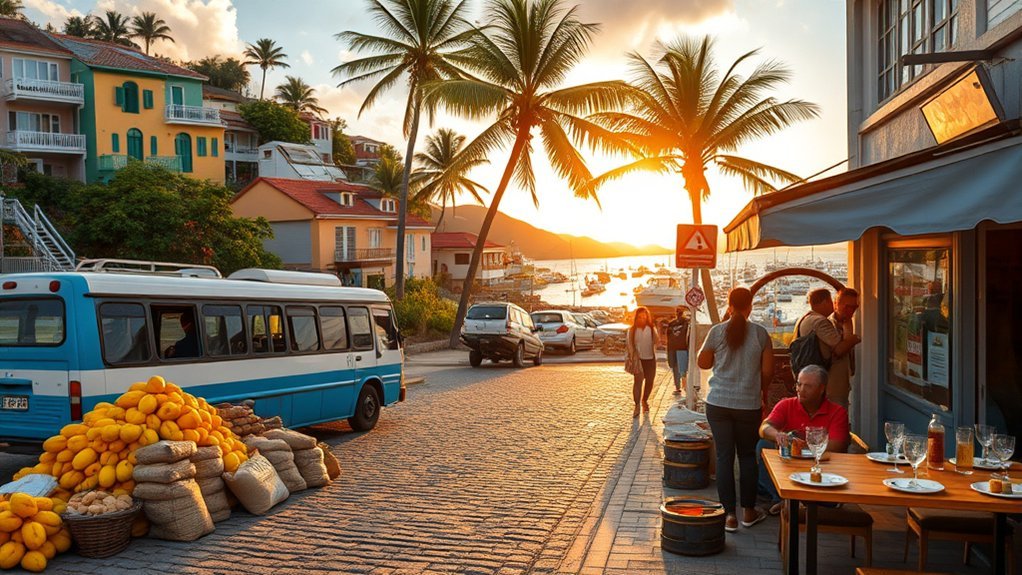You’ll find living costs in Grenada fairly affordable compared with many places. A single person typically needs about EC$3,582/month to live comfortably, while a family of four averages EC$8,959. Rent varies widely — city one-bedrooms run around EC$641 and three-beds EC$1,140 — and groceries, utilities, transport and private healthcare add modest additional costs. Budget for property purchase fees or citizenship options if you’re buying, and keep reading to get detailed breakdowns.
Housing and Real Estate Costs in Grenada
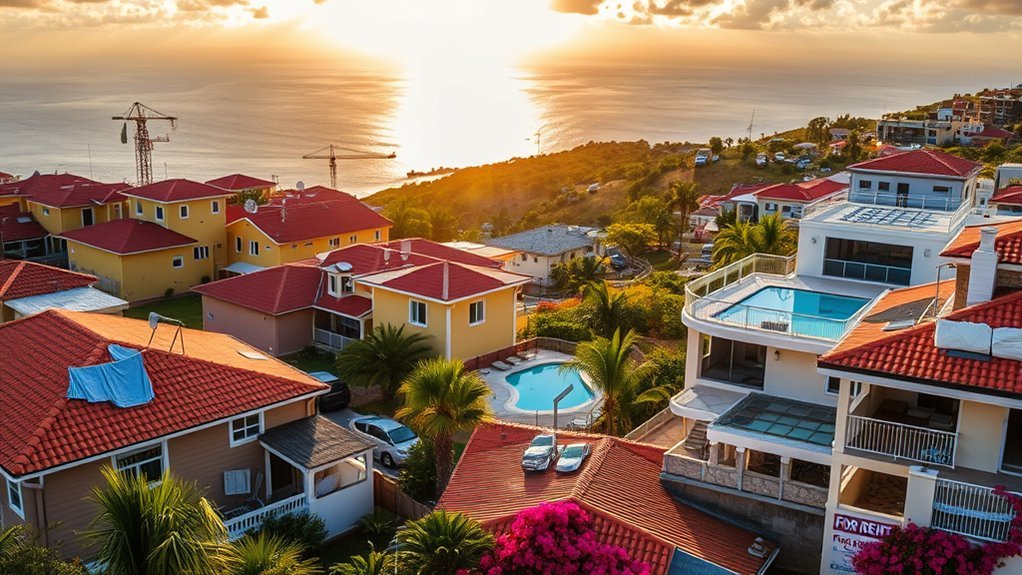
When you’re weighing housing in Grenada, expect a wide range of options and prices: city-center one-bedroom rentals average about $641/month and three-bedrooms about $1,140, while outside the center you’ll find one-bedrooms near $395 and three-bedrooms around $638.
You’ll see St George’s and Grand Anse dominate listings, with expatriate areas offering more upscale three-bedroom apartments and villas. If you’re renting, compare locations: city conveniences versus quieter suburbs or Carriacou.
St George’s and Grand Anse lead listings; expatriate neighborhoods feature upscale three-bed apartments and villas—choose city convenience or quieter suburbs.
For property purchase, real estate spans modest homes to luxury estates; property purchase prices run from about $160,000 to over $7,000,000 depending on type and location.
As a foreign buyer, remember the Alien Landholder License adds roughly 10% to the purchase cost, so factor that into your budget and negotiations.
Work with a local agent who knows zoning and title issues, and inspect properties thoroughly before committing to renting or buying in Grenada.
Everyday Living Expenses and Food Prices
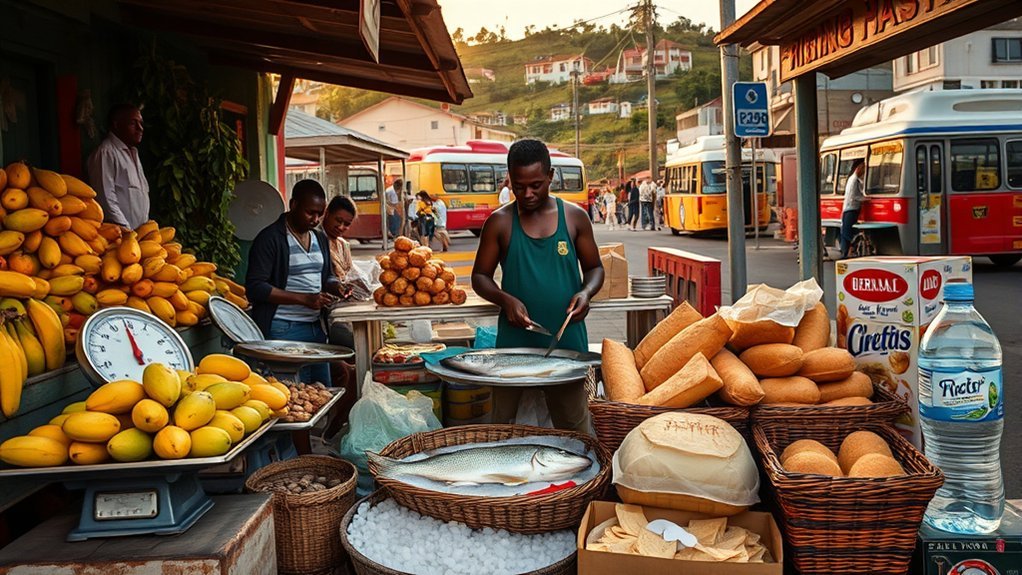
Everyday expenses in Grenada are manageable but vary depending on your lifestyle and whether you buy local or imported goods. You’ll find grocery prices reasonable if you favor local food: a dozen large eggs EC$6.00, tomatoes EC$12/kg, and local cheese about EC$15 for 500 g.
Utility expenses (electricity, water, internet) average around EC$48 monthly, so factor that into your budget.
- Monthly budgeting: Estimated monthly costs run about EC$3,582 for a single person and EC$8,959 for a family of four; use these figures to plan rent plus everyday expenses.
- Dining out: Casual meals average EC$20; a three-course dinner for two is roughly EC$80, useful for social planning or special occasions.
- Transport: Public transportation is affordable—one-way tickets cost about EC$5.00, and a monthly ticket is EC$100—so commuting won’t break the bank when living in Grenada.
Healthcare, Education, and Insurance Expenses
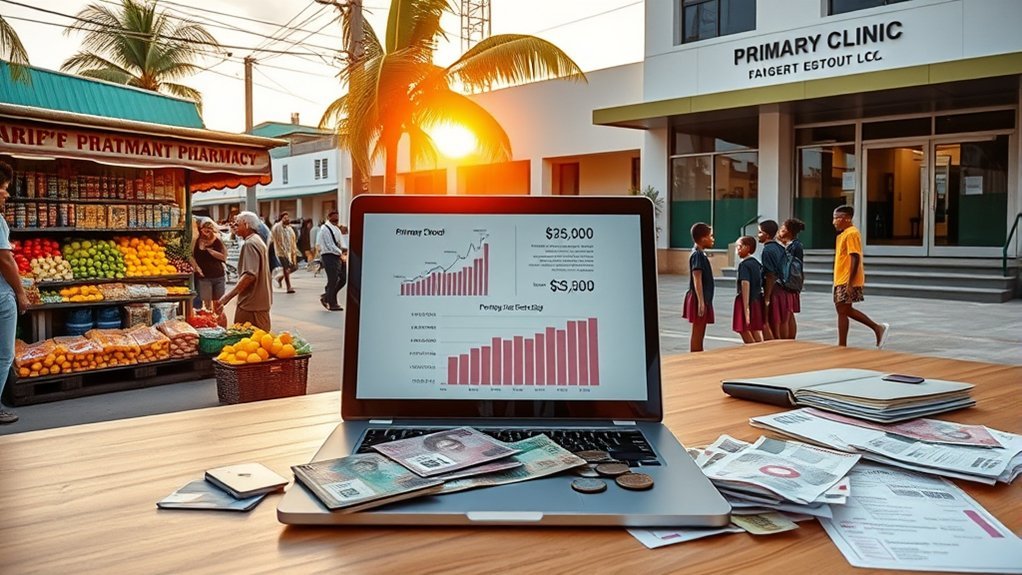
Beyond groceries, utilities and transport, you’ll also want to factor in healthcare, schooling and insurance when planning your budget in Grenada. You’ll find a mix of public and private healthcare: the General Hospital in St. George’s handles most primary healthcare needs, while many expatriates prefer private clinics for faster service. A private doctor visit averages EC$90; basic meds can add up, so include those in your budget. Public care is cheaper, but you should get health insurance that covers local treatment and medical evacuation for serious cases. Primary education is free and compulsory (ages 5–16); private and international school tuition runs roughly EC$2,500–EC$10,000 annually. St. George’s University brings international students, especially in medicine and veterinary studies, which can affect local education options. Plan insurance and tuition costs early so you’re not caught off guard.
| Item | Typical Cost | Notes |
|---|---|---|
| Private visit | EC$90 | short consultation |
| Cold meds (6 days) | EC$66 | basic meds |
| Private tuition | EC$2,500–10,000 | annual |
| Public care | Lower cost | General Hospital |
| Health insurance | Varies | include evacuation |
Transportation, Utilities, and Communication Costs
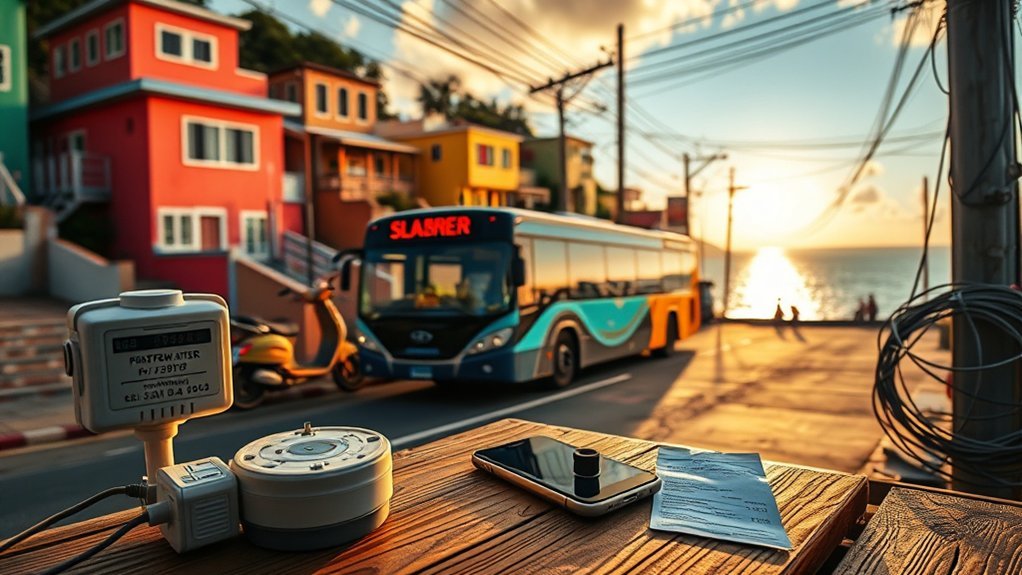
One-way local fares run about EC$1.10 and a monthly pass is roughly EC$100, so you can keep commuting costs low if you rely on public transport; taxis, however, start at about EC$22.20 and add up quickly for regular use.
You’ll find transportation options suit different budgets: local buses and minibuses are cheapest, taxis are convenient, and owning a car brings fuel costs (~EC$4.90/gal).
- Public transport and taxis: A local transport ticket costs EC$1.10, a monthly public transport pass is EC$100, and taxi services start at EC$22.20 — choose based on frequency and convenience.
- Utilities: Expect electricity, water, and internet combined to average about EC$48 monthly, though usage and air conditioning will raise electricity bills.
- Communication costs: Mobile phone plans with calls and 10GB data run around EC$18.50/month, and internet options vary by speed and location.
Plan your budget around transport mode, utilities, and communication costs for realistic monthly estimates.
Taxes, Residency Options, and Financial Considerations

If you’re planning long-term stays or a move to Grenada, you’ll find a tax and residency framework that’s straightforward and often favorable for expatriates. You’ll benefit from no capital gains tax, no inheritance tax, and no tax on worldwide income, though local income tax runs 10–28% and corporate tax is 28%. For residency options, consider the Citizenship by Investment route (National Transformation Fund donation from $235,000 or real estate investment from $270,000 for joint projects) or standard permits. Buying property requires an Alien Landholding License (10% fee) unless acquired via the citizenship program. Factor taxes and fees into your cost of living and daily expenses planning, and declare foreign income appropriately if applicable. Get private health insurance and medical evacuation coverage because public healthcare can be limited. Use real estate investment wisely: it can secure residency or citizenship and reduce long-term costs, but always budget for taxes, license fees, insurance, and routine daily expenses.
| Topic | Key point |
|---|---|
| Taxes | No cap gains/inheritance |
| Income rates | 10–28% |
| Corporate | 28% |
| CBI costs | $235k / $270k+ |
| Property fee | 10% A.L.L. |
Frequently Asked Questions
Can a US Citizen Live in Grenada?
Yes — you can live in Grenada; with your US passport you get 90 days visa-free, then pursue Grenada residency or citizenship. You’ll face visa requirements, adapt to lifestyle differences, housing options, healthcare access, local cuisine, language barrier, cultural integration, expat community.
What Is the Average Salary in Grenada in US Dollars?
You’ll earn about $800–$1,200 monthly on average; average income trends reflect local industries and tourism impact, affecting job opportunities, expatriate benefits, salary negotiation, work permits, employment sectors, cost of living, currency exchange.
How Much Is a Gallon of Milk in Grenada?
A gallon of milk in Grenada is about $10.00, so you’ll factor milk prices into grocery costs; check local supermarkets, compare dairy imports, and adjust your food budget for family expenses, nutrition options, lifestyle choices, market trends.
How Long Can a US Citizen Stay in Grenada?
Like a stopwatch ticking, you can stay in Grenada up to 90 days visa-free; extensions require applying to Immigration. Mention Grenada travel, visa requirements, residency permits, cultural experiences, local cuisine, safety concerns, expat communities, healthcare system, language barriers, cost of living.
Conclusion
You’ll find Grenada can be surprisingly affordable or unexpectedly pricey, depending on the lifestyle you choose. Housing and food often set the tone, while healthcare, schools, transport, and utilities quietly add up. Residency options and taxes change the final picture. Before you decide, gather quotes, visit neighborhoods, and map monthly bills — then pause. When you total it all, you’ll know whether Grenada fits your budget… or whether it’s time to rethink the plan.

